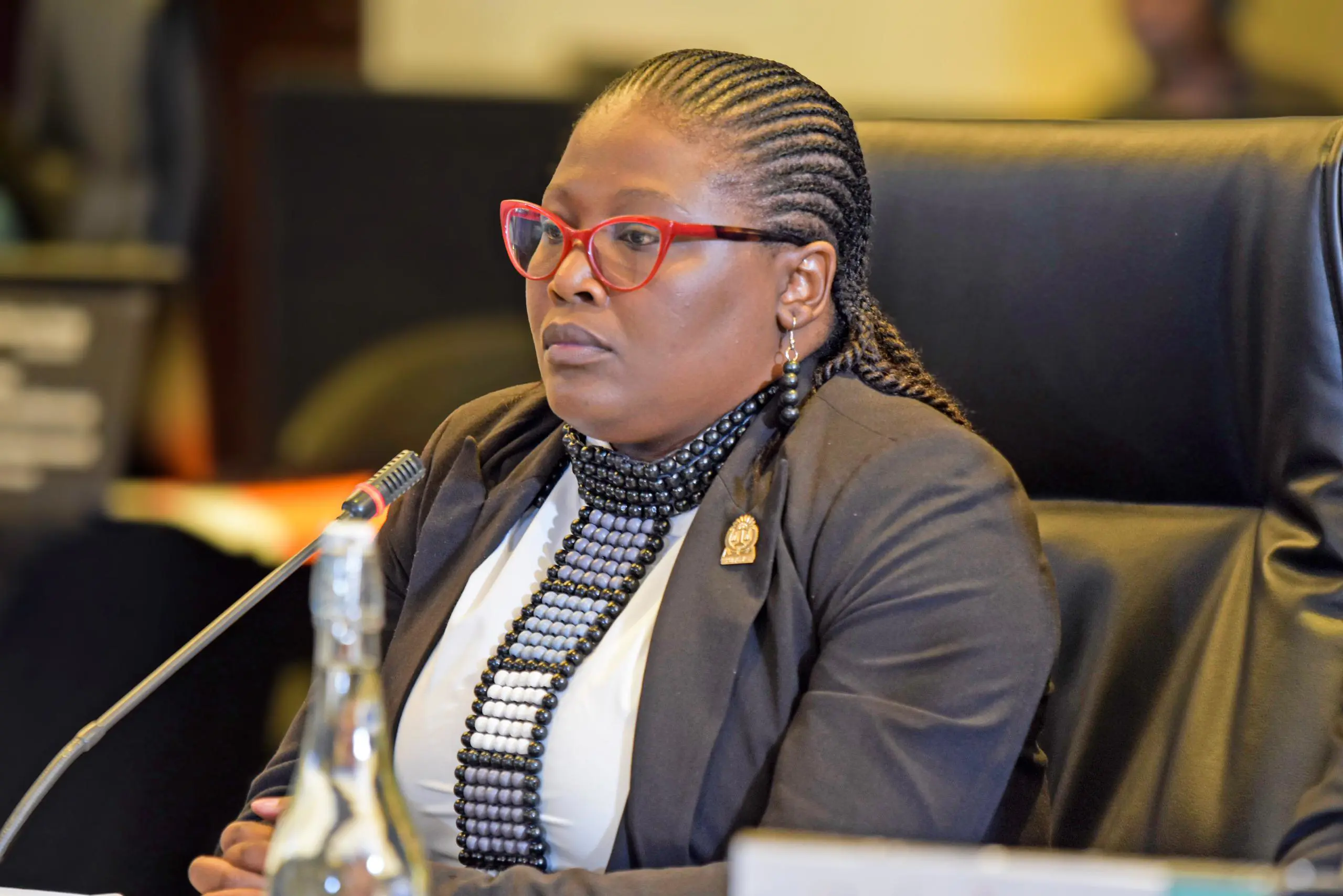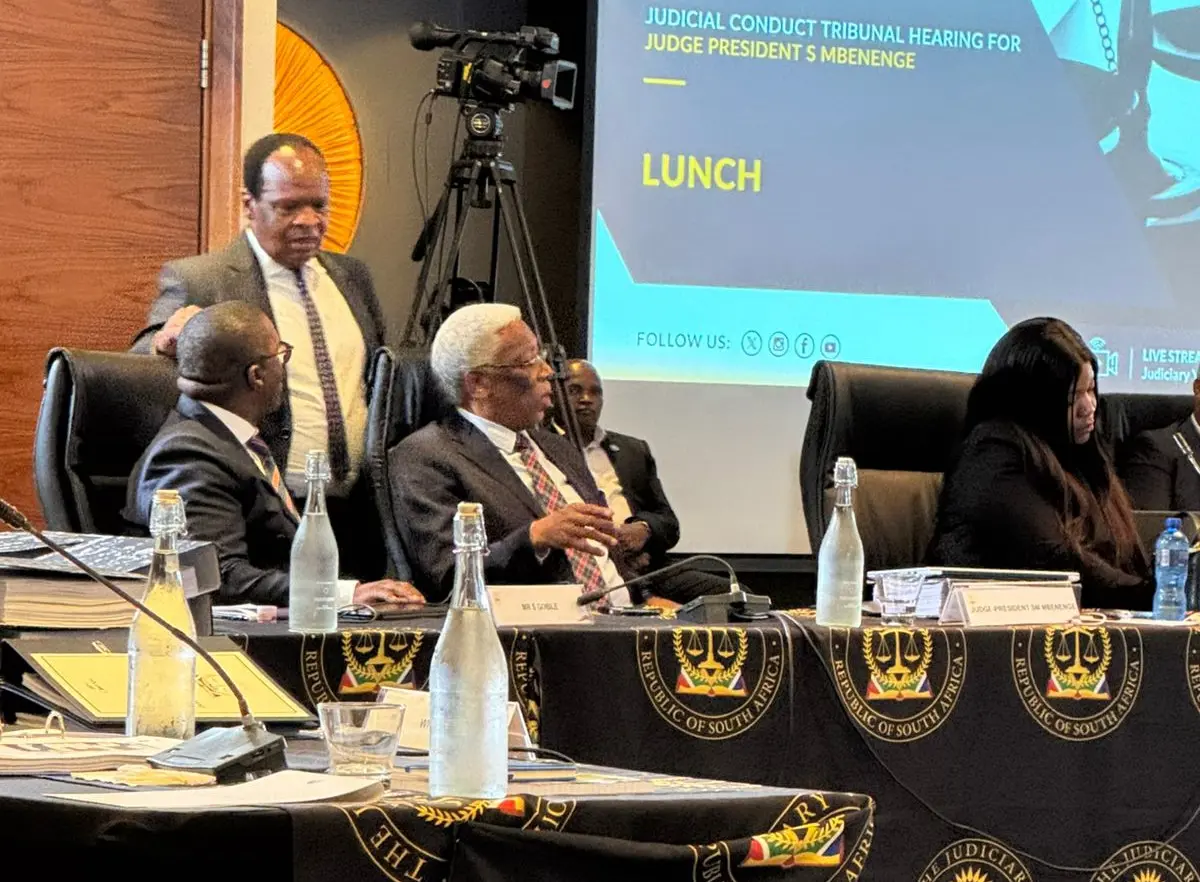Robes and reputations: The tribunal of Eastern Cape Judge President, Selby Mbenenge
Zoleka Qodashe
5 May 2025 | 5:22On Monday, all eyes will be back on the judicial conduct tribunal as it resumes its probe into the conduct of Eastern Cape judge president, Selby Mbenenge.
When judges hand down judgments, the public leans in. Not out of Schadenfreude, but because the integrity of the judiciary sits at the heart of our constitutional democracy.
And when that integrity is compromised — especially under the shadow of sexual harassment allegations — citizens don’t just lean in; they listen closely.
On Monday, all eyes will be back on the judicial conduct tribunal as it resumes its probe into the conduct of Eastern Cape judge president, Selby Mbenenge.
This time, the respondent himself, may be on the witness stand to give testimony along with other witnesses in his case.
This judicial inquiry is the first of its kind and has all the makings of a legal potboiler: a powerful judge, a vulnerable court staffer, damning allegations and the ever-tightening knot of public scrutiny.
At the core of the matter are serious allegations levelled by a high court secretary, Andiswa Mengo - a woman who claims the Judge President made unwelcome sexual advances towards her.
According to her complaint, what started as professional contact devolved into persistent, allegedly unwanted messages and conduct that left her feeling violated and undermined.
The interactions took place between 2021 and 2022, while Mengo filed a complaint in 2023.
It’s been defined by some as a classic power imbalance tale.
Mbenenge, for his part, has vehemently denied that the interactions – which took place on social media platform WhatsApp – were unwanted. He does not dispute that the exchanges with sexual innuendos happened, but he disputes sending her explicit content.

Sexual harassment allegations
What is the explicit content he is alleged to have sent? Well, in one instance Mengo alleges that the Judge President sent her pictures exposing his manhood to her.
The junior staffer also alleges that he asked her for nude photos of herself, what her favourite sexual position is and on one occasion, even called her to his chambers where he allegedly drew her attention to his bulging crotch.
However, during cross-examination by Mbenenge’s legal counsel, Muzi Sikhakhane SC, attempts were made to discredit Mengo and poke holes in her testimony. Among the instances thrust in the spotlight is a text in which Mengo called the top judge “daddy” and wished him a happy Father’s Day.
Mengo also made flattering comments towards the judge, calling him ‘cute’ but failed to explain why she made such comments to the man she accused of sexual harassment.
Mbenenge’s defence hinges on the nature of their interactions, which he claims were consensual. He has, throughout, maintained that his conduct received no outright rejection from the complainant.
Mengo also explained that her responses to the jurist were driven by fear given the seniority of the head of the Eastern Cape division of the High Court and the fact that she is a single mother who cannot risk losing her job.
This will be the task of the tribunal, to establish whether the interactions were unwelcome by Mengo.

How does a tribunal work?
The judicial conduct tribunal is the judiciary’s internal mechanism to investigate complaints against judges.
The tribunal is chaired by a retired judge - Judge President, Bernard Ngoepe who is assisted by two other members — one of whom is also a retired judge herself, Cynthia Pretorius as well as a non-judicial member, Advocate Gift Mashaba.
Their job is to determine whether the judge in question has acted in a manner so unbecoming that it warrants a gross misconduct finding.
The establishment of a tribunal triggers the impeachment process of the judge as per section 177 of the Constitution of the Republic of South Africa.
If the tribunal makes a gross misconduct finding against the top judge, it will present a report to the judicial service commission that will consider it and may confirm the finding of the tribunal.
The constitution provides three grounds upon which a judge can be impeached, one of which is gross misconduct, another being gross incompetence and the last being that the judge suffers from an incapacity.
Therefore, if the finding of guilt is made against the judge and the JSC confirms it, it will then go to the National Assembly which has to vote on the matter. Only a two-thirds majority, that is 267 of the 400 members of parliament must vote in favour of the impeachment, can give effect to the gross misconduct finding.
Thereafter, the president must act on the decision of the legislative body and addresses a letter to the judge explaining the date upon which they will cease to be such.
After this, the judge loses all their benefits including a lifetime salary of over R2 million, in the case of judge president, Mbenenge.
May 5: The return of the tribunal
Now, with the resumption scheduled for Monday, the tribunal is expected to have Mbenenge’s witnesses called to the stand as well as the senior judge under scrutiny, himself with all evidence combed through thoroughly. All eyes will be on that all important testimony.
Since the adjournment, judicial ethics and gender-based misconduct have gained renewed traction in the national discourse with the public mood shifting from curiosity to concern.
For Mbenenge, there is much to lose. A finding of gross misconduct could see him removed from the bench, a rare and ignominious end to a previously distinguished career. But some argue that, with such allegations, the judiciary’s repute as a whole has already lost.
For the complainant, who has already detailed the impact such an ordeal has had on her, “It broke me. It took away my dignity. It took away the kindness that I have always shown to my colleagues and people around. It left me naked and it tore me apart” the outcome – which may not come anytime soon – will no doubt leave a lasting impact on her.
And for the rest of the country, the tribunal and the testimonies before it have lifted a veil on elements within the judiciary which have often gone unnoticed, puncturing the myth of judicial infallibility.
Trending News
More in Local

14 December 2025 15:10
Gauteng Education says 95% of Grade 1 and Grade 8 learners placed for the 2026 academic year

14 December 2025 15:00
SA Council of Churches says Saulsville mass shooting is one of the most devastating in Tshwane

14 December 2025 14:05
Hanover Park mothers who lost loved ones unite against gang violence











